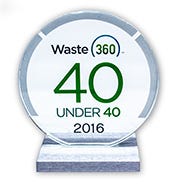Nate Morris of Rubicon Global Uses Technology to Transform the Waste and Recycling Industry
Waste360 spoke with Morris about how he built up Rubicon to become the company it is today, the company’s goals for this year and what the future has in store for Rubicon.
Nate Morris thought he might work in public policy or politics. But he changed course when he saw a $1 trillion waste and recycling industry ripe for disruption.
Morris is the founder and CEO of Rubicon Global, an international cloud-based, full-service waste and recycling company focused on sustainability. With clients ranging from the Fortune 100 to mom-and-pop businesses, Rubicon’s innovative technology platform is helping create jobs for independent haulers and helping businesses save money.
In addition to running Rubicon, Morris is also an active member of the Solid Waste Association of North America (SWANA). Last year, Morris was a keynote speaker at SWANA’s WASTECON conference, which took place in Orlando, Fla.
“From the earliest stage of his career, Nate was unsatisfied with the status quo. He truly believed in the power of technology to disrupt legacy industries for the benefit of both economic and social good,” says Jason Ramsey of Ramco Environmental, one of Rubicon’s network members. “At a time when many young professionals search for a safe path to career success, Nate chose to invest himself completely in solving a critical social and environmental problem.”
Waste360 awarded Morris with a Waste360 40 Under 40 award earlier this year and recently spoke with him about how he built up Rubicon to become the company it is today, the company’s goals for this year and what the future has in store for Rubicon.
 Waste360: How did you start your waste and recycling career?
Waste360: How did you start your waste and recycling career?
Nate Morris: I always thought I would work in public service and certainly never dreamed of being an entrepreneur. I won a scholarship to attend college in Washington, D.C., and while I was there, I worked in the U.S. House, U.S. Senate and White House. After college, I managed political campaigns in my home state of Kentucky.
A few years later, I spent time in China, lecturing in business management at a university and working for the Kentucky Cabinet for Economic Development. While I was in China, I began to see the global challenge waste had become, especially as it relates to development, and filed that away.
I came back to the U.S. to start graduate school at Princeton. I focused my studies on the environment—motivated by the challenges I had witnessed in China and by how policies were impacting the coal industry and jobs in Kentucky.
Princeton was supposed to further prepare me for a career in public policy or politics, but it actually took me in another direction. I started to think about how we could use the free market and technology to disrupt legacy industries and promote social good.
My best friend from high school really piqued my interest in the waste industry, and I started to explore how it worked. I saw a traditional model of waste collection where incentives were grossly misaligned. And I thought there was an incredible opportunity to restack the industry and create a new model.
We did it on a shoestring budget. I maxed out my personal credit cards and sold items on eBay to fund some of our initial expenses. This was in 2008-2009, in the middle of the Great Recession. There was a lot of personal risk involved. But, on the flip side, every potential customer was scrutinizing their bottom line and how they were spending their money. So our pitch to prospective customers was less expensive, more responsible waste and recycling, which made a lot of sense.
I didn’t ever plan on becoming an entrepreneur, but I saw a big challenge—an industry that needed to be changed—and I felt that I could build a business focused on moving the industry forward.
Waste360: How did you build up Rubicon Global to become the company it is today?
 Nate Morris: We have been fortunate to attract incredible people to our industry, and we were able to showcase a big vision from the beginning. Our vision is that the waste and recycling industry must adapt to 21st century changes, particularly changes in data, transparency and technology.
Nate Morris: We have been fortunate to attract incredible people to our industry, and we were able to showcase a big vision from the beginning. Our vision is that the waste and recycling industry must adapt to 21st century changes, particularly changes in data, transparency and technology.
It was our vision for the industry that allowed us to connect with Uber, which is a great example of how quickly technology can disrupt a legacy industry. We've attracted several key individuals from Uber, including Oscar Salazar, who actually built their cloud-based platform, Brent Callinicos, David Plouffe and several others.”
Rubicon continues to attract the best talent from around the country—people with experience in waste, recycling, sustainability, technology, etc. And we’ve been able to accomplish that because of the compelling vision for the future of the industry.
Waste360: Tell us a little bit about your role as founder and CEO of Rubicon Global and the company’s goals for the year.
Nate Morris: Our biggest goal is to be the advocate for the independent hauler. The independent hauler faces tremendous challenges in competing with the few multibillion-dollar giants that have ruled our industry for generations.
Recently, we launched Rubicon Pro, which is a membership-based digital network for haulers to source and buy the items they need to run their business at a discounted price. It also gives them access to growth capital. We will continue to be the advocate for the independent hauling and recycling communities by making businesses run better and be more profitable.
We believe that we can make the greatest impact on the hauling and recycling communities by providing them with the opportunities that they wouldn’t have by themselves. We treat the haulers and recyclers as members of our family and as partners. We want them to be as successful and profitable as possible. We have the ability to make changes that the larger companies cannot, and we can make them at the independent level, which could take years for a larger company to accomplish. This is where we can have a tremendous impact on long-term innovation and long-term partnership for the space.
By the end of the year, we will have more than 550 employees, which is a big accomplishment for us. We currently work with more than 5,000 haulers and recyclers across the U.S., Canada and Puerto Rico. We have also launched internationally in 16 countries and hope to continue to expand to other countries.
Waste360: What advice would you give to those who want to have a career in the industry?
Nate Morris: Our industry presents tremendous opportunity for the next generation. Waste will continue to be a global challenge and will only become more important to businesses and households as policy, technology and CSR standards continue to drive our industry forward.
We need thought leadership and innovators, and we need people who will challenge the status quo and bring new ideas to the table. In addition, we must demand creative and collaborative people who aren’t opposed to looking outside the industry for best practices.
We are at a great intersection where sustainability is becoming a mainstream issue, and one of the biggest opportunities in the sustainability debate that no one really talks about is changing the way that waste programs work.
Millennials today are making purchasing decisions based upon the good that companies do in the world. It’s not good enough anymore to have a good product. You have to be able to show the responsibility and the good work that you are doing as a result of your scale, revenue and opportunity. This is also going to create more opportunities for the next generation.
I would also tell the next generation to not fear the multibillion-dollar companies that are in the space today. We have won our share of business from them and will continue to do so. For the first time, an outsider is competing with them in a significant way. It’s important to be fearless and let your voice and ideas be heard!
Waste360: What does the future of Rubicon entail?
Nate Morris: We are bringing mobile technology to the industry, and I think it will be transformational to the space. I also believe that data transparency and benchmarking is something that occurs in every other industry except the waste space. We need to change that.
We are also focusing on the way we collect data, the way we process data and the way we use data to tell a story on behalf of our customers. We believe that changing the way data is collected and managed is going to be the revolutionary element of any practice or business for the next 10 to 20 years. Data is the new oil, according to many data scientists, and we are just beginning to scratch the surface with the information that we can collect and the learnings that we can gain from the supply chain.
About the Author
You May Also Like




